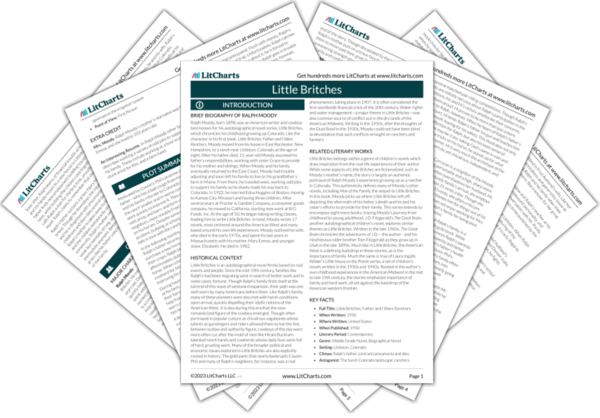In Little Britches, water symbolizes the interconnectedness of the ranchers’ livelihoods and the conflict and community it gives rise to. Though equally essential to all the ranchers along Bear Creek, water does not flow evenly to all the ranchers, with the downstream ranchers being dependent on the generosity of those upstream. Initially, this interconnectedness fosters a sense of community, with Fred Aultland generously agreeing to share his water with Ralph’s father. When a drought begins, however, ranchers upstream from Fred and Ralph’s father begin siphoning off more than their fair share of water. With their crops starting to wither, Ralph’s father and his neighbors are forced to take up arms against the ranchers upstream, battling them secretly at night. Ultimately, Ralph's father mediates a compromise, quelling the violence and restoring peace. Unfortunately, this peace is short-lived as Ralph's father’s newly designed irrigation system, the ditch boxes, is anonymously destroyed and the upstream ranchers resume their predatory practices. When Ralph’s father takes them to court, he and his family are shot at, seemingly in retribution.
This fight over water suggests that the same conditions that have the potential to bond people together can also break them apart. While Fred and Ralph’s father react to the water crisis with generosity, sharing water and seeking compromise, the upstream ranchers respond with greed, monopolizing the resource for themselves. In this way, water serves as a mirror of Colorado’s rancher society. The age-old struggle for resources, embodied here by water, serves as a powerful symbol of the humans’ perpetual battle for survival and the harmony and discord it can create.
Water Quotes in Little Britches
“Why man, you couldn’t run ten inches of water to this garden from where the ditch comes onto your place; the ground would drink it all up on the way. I’ll tell you what I’ll do. I’ve got two hundred inches with my place. I’ll use all the water that comes as far as me for twenty days, then give you the whole head for one. That’ll let you give about twenty acres a good soaking often enough to make a crop the first year. After that you might handle as much as twenty-five.”

Unlock explanations and citation info for this and every other Little Britches quote.
Plus so much more...
Get LitCharts A+“Those fellows up there are holding the trump cards, and they know it. I’m not too sure I wouldn’t take pretty near my full measure of water if I were in their places and saw my crops drying up. I don’t think they want a court fight, or a fist fight, or a gun fight any more than we do, but I don’t think they’re going to give up the hand without winning the odd trick. I wouldn’t do it, and I don’t think any of you fellows would. I’m inclined to think we’d be better off to have the assurance of a reasonable part of our share in dry time, than to take the chance of not getting any and losing all our late crops.”
There weren’t any more fights over water that year, and when Willie Aldivote came up to the pasture to visit me a few days later, he seemed to think Father was quite a hero. I was proud because he said Father could fight like hell for a sick man, and that everybody thought he did a smart job getting the men up the ditch to agree about the water.
“Damn bull-headed Yankee,” he was saying, “God and everybody knows we’d never got a dime for our crops if he hadn’t rigged that water gauge at the ditch head. And there he stands with a hundred and twenty dollars in his hand for a year’s work and too damned proud to take a bale of hay from a neighbor. What the hell are you goin’ to do with a man like that?”












